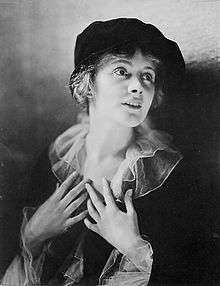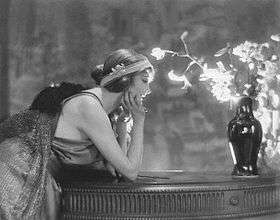Jeanne Eagels
| Jeanne Eagels | |
|---|---|
 | |
| Born |
Eugenia Eagles June 26, 1890 Kansas City, Missouri, U.S. |
| Died |
October 3, 1929 (aged 39) New York City, New York, U.S. |
| Cause of death | Drug overdose |
| Resting place | Calvary Cemetery, Kansas City, Missouri |
| Nationality | American |
| Education |
St. Joseph's Catholic School Morris Public School |
| Occupation | Actress |
| Years active | 1913-1929 |
| Spouse(s) |
Morris Dubinsky (m.?; div.?) Edward Harris "Ted" Coy (m. 1925; div. 1928) |
Jeanne Eagels (June 26, 1890 – October 3, 1929) was an American actress on Broadway and in several motion pictures.[1] She was a former Ziegfeld Follies Girl who went on to greater fame on Broadway and in the emerging medium of sound films. Eagels was a preeminent Broadway actress in the 1910s and 1920s.
She was posthumously considered for the Academy Award for Best Actress for her 1929 role in The Letter after dying suddenly that year at the age of 39. That nomination was the first posthumous Oscar consideration for any actor, male or female.
Early life
Eugenia Eagles[2] was the second of six children born to Edward, of German and French Huguenot descent, and his wife Julia Eagles (née Sullivan), who was of Irish descent.[3] Jeanne, who later changed the spelling of her surname to "Eagels", would later claim that her father was a Spanish architect and she was born in Boston. In reality, she was born in Kansas City, Missouri and her father was a carpenter.[4] Edward Eagles died in February 1910.
Eagels attended St. Joseph's Catholic School and Morris Public School. She quit school shortly after her First Communion to work as a cash girl in a department store.[3]
Career
Eagels began her acting career in Kansas City, appearing in a variety of small venues at a very young age. She left Kansas City around the age of 15 and toured the Midwest with the Dubinsky Brothers' traveling theater show. At first, she was a dancer, but in time she went on to play the leading lady in several comedies and dramas put on by the Dubinskys. As a teenager, she married Morris Dubinsky, who frequently played villain roles.

Around 1911, she moved to New York City, working in chorus lines and eventually becoming a Ziegfeld Girl. Her hair was brown, but she bleached it when she went to New York. During this period, one of her acting coaches was Beverley Sitgreaves. Eagels was in the supporting cast of Mind The Paint Girl at the Lyceum Theatre in September 1912. Eagels played opposite George Arliss in three successive plays in 1916 and 1917.
In 1915, she appeared in her first motion picture. She also made three films for Thanhouser Film Corporation in 1916-17. In 1918, she appeared in Daddies, a David Belasco production. She quit this show due to illness and subsequently travelled to Europe. She appeared in several other Broadway shows between 1919 and 1921.
In 1922, she made her first appearance as a star in the play Rain, by John Colton and Clemence Randolph, based on a short story by W. Somerset Maugham. Eagels played her favorite role, that of Sadie Thompson, a free-wheeling and free-loving spirit who confronts a fire-and-brimstone preacher on a South Pacific island. She went on tour with Rain for two more seasons and returned to Broadway to give a farewell performance in 1926.
In 1926, Eagels was offered the part of Roxie Hart in Maurine Dallas Watkins's play Chicago, but Eagels walked out of this role during rehearsals. She next appeared in the comedy Her Cardboard Lover (1927), in which she appeared on stage with Leslie Howard. She then went on tour with Her Cardboard Lover for several months. After missing some performances due to ptomaine poisoning, Eagels returned to the cast in July 1927 for an Empire Theater show.
After a season on Broadway, she took a break to make a movie. She appeared opposite John Gilbert in the MGM film Man, Woman and Sin (1927), directed by Monta Bell. In 1928, after failing to appear for a performance in Milwaukee, Wisconsin, Eagels was banned by Actors Equity from appearing on stage for 18 months. The ban did not stop Eagels from working in film, and she made two "talkies" for Paramount Pictures: The Letter and Jealousy (both released in 1929).
Personal life
Eagels was married twice. Her first marriage was to actor Morris Dubinsky whom she married when she was a teenager. The couple reportedly had a son who either died (causing Eagels to have a nervous breakdown) or who was given up for adoption after the couple separated. Eagels and Dubinsky eventually divorced.[5] In August 1925, Eagels married Edward Harris "Ted" Coy, a former Yale University football star turned stockbroker. They had no children and divorced in July 1928.[6]
Death and legacy
During the peak of her success, Eagels began abusing drugs and alcohol and eventually developed an addiction. She went to several sanitariums in an effort to kick her dependency. By the mid-1920s, she had begun using heroin. When she entered her 30s, Eagels began suffering from bouts of ill health that were exacerbated by her excessive use of drugs and alcohol.[7]
In September 1929, Eagels underwent eye surgery at St. Luke's Hospital in New York City. At the time, she was also suffering from breathing problems and neuritis. After a ten-day stay, she returned to her apartment on Park Avenue. On October 3, 1929, Eagels and her secretary walked to the Park Avenue Hospital where Eagels had an appointment. While talking to the doctor, she began having convulsions and died shortly thereafter.[8] The assistant chief medical examiner who performed Eagels' autopsy concluded that she died of "alcoholic psychosis". The medical examiner stated that while Eagels had not consumed alcohol in the two days preceding her death, she had been "acting strangely" and suffering from hallucinations three or four days before she died.[6] Toxicology reports revealed that Eagels still had alcohol in her organs when she died in addition to heroin and chloral hydrate (a sedative that Eagels regularly took to sleep).[8][9] Her death was attributed to an overdose of the chloral hydrate.[9][10][11]
After services in New York at the Frank E. Campbell Funeral Chapel, Eagels received a second funeral service when her body was returned to Kansas City on October 7, where she was buried in Calvary Cemetery.[12] She was survived by her mother Julia Eagles and several brothers and sisters.[11]
Eagels was posthumously nominated for the second annual Academy Award for Best Actress for her role in The Letter. She lost to Mary Pickford for the film Coquette. The award is described as an early example of cronyism in the academy, as early meetings of the Academy were held at Pickfair. Many believed the award should have gone to Eagels.[13]
In 1957, a mostly fictionalized film biography, titled Jeanne Eagels, was made by Columbia Pictures, starring Kim Novak as Eagels.
Filmography
| Year | Title | Role | Notes |
|---|---|---|---|
| 1913 | The Ace of Hearts | ||
| 1913 | The Bride of the Sea | ||
| 1914 | A Lesson in Bridge | Mrs. Willis | |
| 1915 | The House of Fear | Grace Cramp | |
| 1916 | The World and the Woman | A Woman of the Streets | |
| 1917 | The Fires of Youth | Billy's Sister | Credited as Jeanne Eagles |
| 1917 | Under False Colors | Countess Olga | |
| 1918 | The Cross Bearer | Liane de Merode | |
| 1919 | The Madonna of the Slums | ||
| 1927 | Man, Woman and Sin | Vera Worth | |
| 1929 | The Letter | Leslie Crosbie | Nominated: Academy Award for Best Actress |
| 1929 | Jealousy | Yvonne | Lost film |
References
- 1900 United States Federal Census, Kansas City, Jackson County, Missouri, June 4, 1900, ED 111, p. 5.
- 1910 United States Federal Census, Kansas City Ward 9, Jackson County, Missouri, Enumeration District 111.
- Blum, Daniel (1952). Great Stars of the American Stage. Page 80.
- Kansas City Star, Edward W. Eagles Mortuary Notice, February 15, 1910.
- Kansas City Star "Another Kansas City Girl 'Arrives' October 5, 1913 Page 15
- Kansas City Post "Jeanne Eagles passes up Wales to play 'Rain" before mother" April 10, 1925 p. 29
- New York Times, "This Week To See Rush Of New Plays", September 8, 1912, Page X4.
- New York Times, "Jeanne Eagels Playing Again", July 13, 1927, Page 20.
- New York Times, "The Vacillating Vampire", December 5, 1927, Page 26.
Footnotes
- ↑ Obituary Variety, October 16, 1929, page 67.
- ↑ Although many biographies state that her birth name was Amelia Jeanne Eagles, her actual birth name was "Eugenia Eagles" according to both the 1900 and 1910 United States Federal Censuses for Kansas City, Missouri
- 1 2 James, Edward T.; Wilson James, Janet; Boyer, Paul S., eds. (1971). Notable American Women, 1607-1950: A Biographical Dictionary, Volume 1. Harvard University Press. p. 537. ISBN 0-674-62734-2.
- ↑ Golden, Eve (2000). Golden Images: 41 Essays on Silent Film Stars. McFarland. p. 27. ISBN 0-786-48354-7.
- ↑ Golden 2010 p.28
- 1 2 "Jeanne Eagels, Actress, Dies In Convulsions". The Miami News. October 3, 1929. p. 1. Retrieved September 12, 2014.
- ↑ Golden 2010 p.29
- 1 2 Golden 2010 p.31
- 1 2 "Sleep Potion Kills Actress". Sarasota Herald-Tribune. October 5, 1929. p. 4. Retrieved September 12, 2014.
- ↑ Onofrio, Jan (2001). Missouri Biographical Dictionary (3 ed.). North American Book Dist LLC. p. 220. ISBN 0-403-09598-0.
- 1 2 "Plan Rites For Star". The Pittsburgh Press. October 5, 1929. p. 2. Retrieved September 12, 2014.
- ↑ "Jeanne Eagels Funeral Held". The Pittsburgh Press. October 7, 1929. p. 45. Retrieved September 12, 2014.
- ↑
External links
| Wikimedia Commons has media related to Jeanne Eagels. |
- Jeanne Eagels at the Internet Movie Database
- Jeanne Eagels at the Internet Broadway Database

- Jeanne Eagels at Find a Grave
- Jeanne Eagels photo taken in 1917 not published until 1974; NYP Library collection
- Biographical website